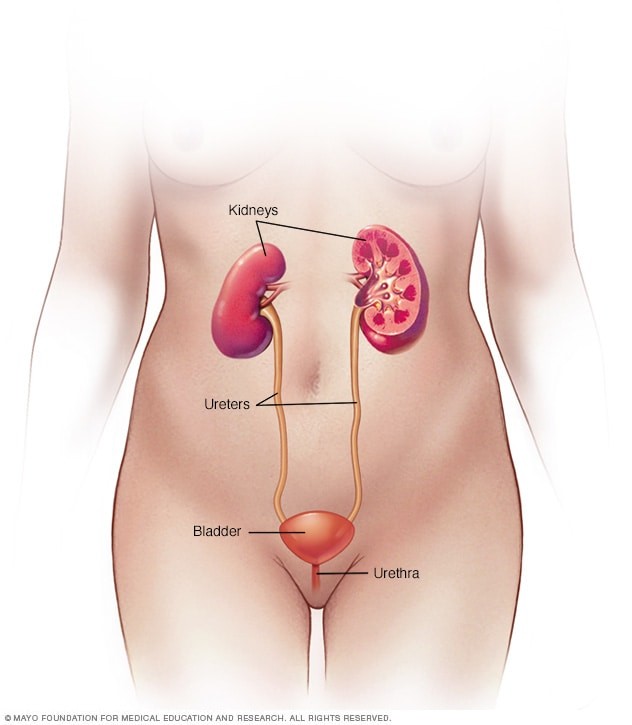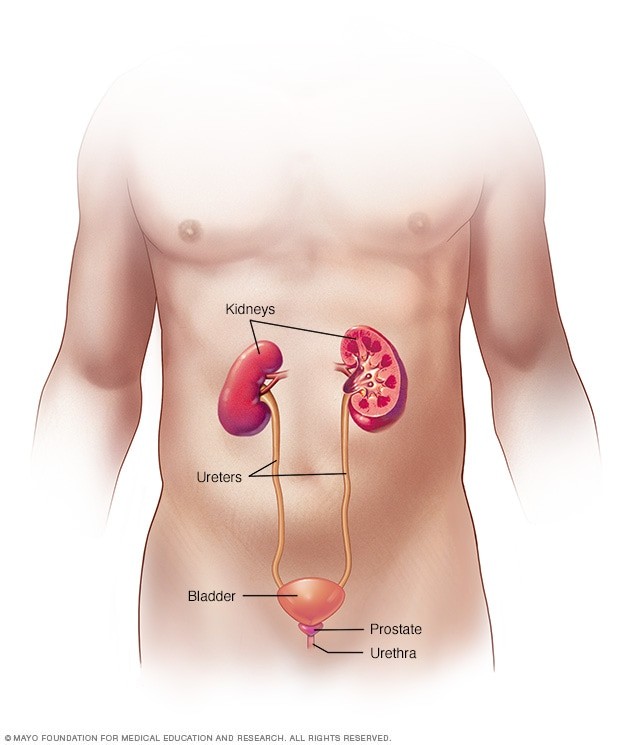Are you concerned about blood in your urine and seeking reliable information? WHAT.EDU.VN provides a comprehensive guide to understand hematuria, its causes, and what steps to take. We offer a free question-and-answer platform, alongside related medical conditions and diagnostic procedures, enabling you to understand this symptom better.
1. Understanding Hematuria: What is Blood in Urine?
Hematuria, or blood in the urine, can be a scary symptom, but it’s important to understand what it means. It refers to the presence of red blood cells in the urine. There are two types:
- Gross hematuria: You can see the blood, making the urine appear pink, red, or cola-colored.
- Microscopic hematuria: The blood is only visible under a microscope during a urine test.
Regardless of whether the blood is visible or microscopic, it’s crucial to determine the underlying cause with the help of medical advice. Remember, WHAT.EDU.VN is here to answer any questions you have about your health.
2. Recognizing the Signs: Symptoms of Blood in Urine
The most obvious sign of hematuria is discolored urine. It can range from a faint pink tinge to a deep red or even a brownish color. The color change depends on the amount of blood present. Other symptoms that may accompany blood in the urine include:
- Painful urination (dysuria)
- Frequent urination
- Urgency to urinate
- Lower abdominal pain
- Blood clots in the urine
- Back pain or flank pain
It’s important to note that some medications, such as phenazopyridine, and certain foods, like beets, can also change the color of your urine. If you’re unsure, seek medical advice. At WHAT.EDU.VN, you can ask for clarification and get answers from knowledgeable individuals.
3. Identifying the Culprits: Common Causes of Hematuria
Several conditions can lead to blood in the urine. These range from minor infections to more serious illnesses. Here’s a detailed look at some common causes:
3.1. Infections of the Urinary Tract (UTIs)
UTIs are a frequent cause, especially in women. Bacteria enter the urinary tract through the urethra and multiply in the bladder. Symptoms often include painful urination, frequent urges to urinate, and blood in the urine.
3.2. Infections of the Kidneys
Also known as pyelonephritis, kidney infections can occur when bacteria travel from the bladder to the kidneys. Symptoms are similar to UTIs but may also include fever, flank pain, and nausea.
3.3. Kidney and Bladder Stones
Minerals in the urine can crystallize and form stones in the kidneys or bladder. These stones can cause irritation and bleeding as they move through the urinary tract.
3.4. Enlarged Prostate (Benign Prostatic Hyperplasia – BPH)
In men, an enlarged prostate can compress the urethra, leading to urinary problems and sometimes blood in the urine.
3.5. Kidney Disease (Glomerulonephritis)
This condition involves inflammation of the kidney’s filtering units (glomeruli). It can be caused by infections, autoimmune diseases, or other underlying conditions.
3.6. Cancer
Blood in the urine can be a sign of cancer in the bladder, kidneys, or prostate. It’s important to remember that early detection is key for successful treatment.
3.7. Inherited Disorders
Certain genetic conditions, such as sickle cell anemia and Alport syndrome, can damage the kidneys and cause blood in the urine.
3.8. Injury to the Kidneys
Trauma to the kidneys from an accident or sports injury can lead to hematuria.
3.9. Medications
Certain medications, such as blood thinners (anticoagulants) and some chemotherapy drugs, can increase the risk of bleeding in the urinary tract.
3.10. Strenuous Exercise
In rare cases, strenuous exercise can cause blood in the urine. This is sometimes referred to as “exercise-induced hematuria.”
4. Recognizing Your Risk: Risk Factors for Hematuria
While anyone can experience blood in their urine, certain factors can increase your risk. Understanding these risk factors can help you take proactive steps to maintain your health.
4.1. Age
Older men are more prone to hematuria due to the increased likelihood of prostate enlargement. Additionally, the risk of certain cancers that cause blood in urine rises with age, particularly after 50.
4.2. Gender
Women are more susceptible to urinary tract infections, a common cause of hematuria.
4.3. Family History
If you have a family history of kidney disease or kidney stones, your risk of developing hematuria may be higher.
4.4. Medications
As mentioned earlier, certain medications, such as blood thinners and some pain relievers, can elevate the risk of blood in the urine.
4.5. Exposure to Certain Chemicals
Exposure to certain chemicals, such as those found in some industrial settings, can increase the risk of bladder cancer and, consequently, hematuria.
4.6. Smoking
Smoking is a known risk factor for bladder cancer, a potential cause of blood in the urine.
4.7. Strenuous Exercise
Athletes who engage in intense physical activity may be at a higher risk of exercise-induced hematuria.
5. Why It Matters: The Importance of Seeing a Doctor
It’s vital to see a healthcare provider any time you notice blood in your urine. While it might be a harmless issue, it could also indicate a more serious condition that needs prompt diagnosis and treatment. Early detection of underlying problems can significantly improve outcomes.
6. Unlocking Answers: Diagnostic Tests for Hematuria
When you see a doctor about blood in your urine, they will likely perform several tests to determine the cause. These tests may include:
6.1. Urinalysis
A urine sample is examined under a microscope to check for red blood cells, white blood cells, bacteria, and other abnormalities.
6.2. Urine Culture
If a urinary tract infection is suspected, a urine culture can identify the specific type of bacteria causing the infection.
6.3. Imaging Tests
- CT Scan: This imaging technique can help visualize the kidneys, bladder, and ureters to detect stones, tumors, or other abnormalities.
- Ultrasound: An ultrasound can also be used to examine the kidneys and bladder.
- Cystoscopy: A thin, flexible tube with a camera is inserted into the urethra to visualize the inside of the bladder.
6.4. Kidney Biopsy
In some cases, a kidney biopsy may be necessary to examine a small sample of kidney tissue under a microscope. This can help diagnose certain kidney diseases.
7. Finding Solutions: Treatment Options for Hematuria
Treatment for blood in the urine depends on the underlying cause. Here are some common treatment approaches:
7.1. Infections of the Urinary Tract (UTIs)
Antibiotics are typically prescribed to treat UTIs.
7.2. Kidney Infections
Kidney infections also require antibiotics, often given intravenously in severe cases.
7.3. Kidney and Bladder Stones
Small stones may pass on their own with plenty of fluids. Larger stones may require treatment such as:
- Extracorporeal shock wave lithotripsy (ESWL): Uses sound waves to break up the stones.
- Ureteroscopy: A thin scope is used to remove the stones.
- Surgery: In rare cases, surgery may be necessary to remove very large stones.
7.4. Enlarged Prostate (BPH)
Treatment options include medications to shrink the prostate or surgery to remove excess tissue.
7.5. Kidney Disease (Glomerulonephritis)
Treatment depends on the specific type of glomerulonephritis and may include medications to suppress the immune system.
7.6. Cancer
Treatment for cancer depends on the type and stage of the cancer and may include surgery, chemotherapy, radiation therapy, or immunotherapy.
7.7. Inherited Disorders
Treatment focuses on managing the symptoms and preventing complications.
7.8. Injury to the Kidneys
Treatment depends on the severity of the injury and may include rest, pain medication, or surgery.
7.9. Medications
If a medication is causing blood in the urine, your doctor may adjust the dosage or switch you to a different medication.
7.10. Strenuous Exercise
In most cases, exercise-induced hematuria resolves on its own with rest.
8. Prevention is Key: Tips to Prevent Hematuria
While not all causes of blood in the urine can be prevented, there are steps you can take to reduce your risk.
8.1. Stay Hydrated
Drinking plenty of water helps flush out bacteria and prevent the formation of kidney stones.
8.2. Practice Good Hygiene
Wipe from front to back after using the toilet to prevent bacteria from entering the urethra.
8.3. Urinate After Intercourse
This can help flush out any bacteria that may have entered the urethra during intercourse.
8.4. Avoid Irritants
Avoid using harsh soaps, douches, and other products that can irritate the urinary tract.
8.5. Manage Underlying Conditions
If you have diabetes, high blood pressure, or other conditions that can affect the kidneys, work with your doctor to manage them effectively.
8.6. Quit Smoking
Smoking increases the risk of bladder cancer, so quitting is one of the best things you can do for your health.
9. The Role of Lifestyle: How Lifestyle Choices Impact Hematuria
Your lifestyle choices can significantly influence your risk of developing hematuria. Here’s a closer look at how different aspects of your lifestyle can play a role.
9.1. Diet
A balanced diet low in salt and processed foods can help prevent kidney stones. Limiting oxalate-rich foods like spinach, rhubarb, and nuts may also be beneficial if you’re prone to calcium oxalate stones.
9.2. Exercise
While strenuous exercise can sometimes cause hematuria, regular moderate exercise is generally beneficial for overall health and can help prevent conditions like obesity and diabetes that can indirectly affect the kidneys.
9.3. Weight Management
Maintaining a healthy weight can reduce your risk of diabetes and high blood pressure, both of which can contribute to kidney problems.
9.4. Stress Management
Chronic stress can weaken your immune system and make you more susceptible to infections. Practicing stress-reducing techniques like yoga, meditation, or deep breathing exercises can be beneficial.
9.5. Alcohol Consumption
Excessive alcohol consumption can damage the kidneys and increase your risk of kidney disease.
10. When to Seek Immediate Medical Attention: Emergency Situations
While blood in the urine is not always an emergency, certain situations require immediate medical attention. Seek immediate medical care if you experience any of the following:
- Heavy bleeding with large blood clots in the urine
- Inability to urinate
- Severe pain in your back, side, or abdomen
- Fever, chills, nausea, or vomiting along with blood in the urine
- Dizziness or fainting
These symptoms could indicate a serious underlying condition that needs prompt treatment.
11. Navigating the Unknown: Hematuria with No Obvious Cause
In some cases, the cause of hematuria may not be immediately apparent despite thorough testing. This is known as idiopathic hematuria. While it can be frustrating, it’s important to continue working with your doctor to monitor your condition and rule out any underlying problems. In many cases, idiopathic hematuria resolves on its own over time.
12. Understanding Hematuria in Children: Special Considerations
Blood in the urine can also occur in children, and the causes can be different from those in adults. Common causes of hematuria in children include:
- Urinary tract infections
- Glomerulonephritis
- Kidney stones
- Inherited disorders
- Injury to the kidneys
It’s important to seek medical attention if you notice blood in your child’s urine, as early diagnosis and treatment can prevent complications.
13. Complementary Therapies: Exploring Alternative Approaches
While medical treatment is essential for addressing the underlying cause of hematuria, some complementary therapies may help support your overall health and well-being. These therapies should not be used as a substitute for medical treatment but can be used in conjunction with it.
- Herbal Remedies: Certain herbs, such as cranberry and uva ursi, have been traditionally used to treat urinary tract infections. However, it’s important to talk to your doctor before using any herbal remedies, as they can interact with medications or have side effects.
- Acupuncture: Acupuncture may help relieve pain and inflammation associated with certain urinary conditions.
- Homeopathy: Some people find homeopathy helpful for managing urinary symptoms. However, there is limited scientific evidence to support the effectiveness of homeopathy.
14. Debunking the Myths: Common Misconceptions About Hematuria
There are several common misconceptions about hematuria that can lead to unnecessary anxiety or delay in seeking medical care. Here are a few myths debunked:
- Myth: Blood in the urine is always a sign of cancer.
- Fact: While blood in the urine can be a sign of cancer, it is often caused by other, less serious conditions, such as infections or kidney stones.
- Myth: If I can’t see the blood, it’s not a problem.
- Fact: Microscopic hematuria can still indicate an underlying problem that needs to be addressed.
- Myth: Blood in the urine always causes pain.
- Fact: Hematuria can be painless, especially in the early stages of some conditions.
- Myth: Once I’ve had blood in the urine, it will always come back.
- Fact: If the underlying cause is treated successfully, the hematuria may not return.
15. Asking the Experts: FAQs About Blood in Urine
Here are some frequently asked questions about blood in urine, answered by medical professionals:
| Question | Answer |
|---|---|
| Is blood in the urine always a serious condition? | Not always. It can be caused by minor issues like UTIs or strenuous exercise, but it can also indicate more serious problems like kidney disease or cancer. A medical evaluation is necessary to determine the cause. |
| What should I do if I see blood in my urine? | See a doctor as soon as possible. They will perform tests to determine the cause and recommend appropriate treatment. |
| Can medications cause blood in the urine? | Yes, some medications, such as blood thinners and certain chemotherapy drugs, can increase the risk of hematuria. |
| Is blood in the urine more common in men or women? | Women are more prone to UTIs, a common cause of hematuria. Men are more likely to experience hematuria due to prostate enlargement, especially as they age. |
| Can diet affect blood in the urine? | Diet can play a role in preventing kidney stones, a potential cause of hematuria. A balanced diet low in salt and processed foods is generally recommended. |
| Can stress cause blood in the urine? | Stress itself does not directly cause blood in the urine. However, chronic stress can weaken your immune system and make you more susceptible to infections, which can lead to hematuria. |
| Is exercise-induced hematuria dangerous? | In most cases, exercise-induced hematuria is not dangerous and resolves on its own with rest. However, it’s important to see a doctor to rule out other potential causes of blood in the urine. |
| Can blood in the urine be a sign of a sexually transmitted infection? | While less common, some sexually transmitted infections (STIs) can cause inflammation of the urinary tract, which may lead to hematuria. |
| Is there a way to prevent blood in the urine? | While not all causes of hematuria can be prevented, staying hydrated, practicing good hygiene, and managing underlying conditions can help reduce your risk. |
| What tests are typically done to diagnose the cause of blood in the urine? | Common tests include urinalysis, urine culture, imaging tests (such as CT scan or ultrasound), and cystoscopy. |


16. The Journey to Recovery: What to Expect After Treatment
After receiving treatment for blood in the urine, it’s important to follow your doctor’s instructions carefully and attend all follow-up appointments. Depending on the underlying cause, recovery may involve taking medications, making lifestyle changes, or undergoing further procedures. Be patient and allow your body time to heal.
17. Empowering You: Resources for More Information
If you’re looking for more information about blood in the urine, here are some reliable resources:
- Mayo Clinic: https://www.mayoclinic.org/
- National Kidney Foundation: https://www.kidney.org/
- National Institutes of Health (NIH): https://www.nih.gov/
These organizations offer comprehensive information about various health conditions, including those related to the urinary system.
18. Get Your Questions Answered on WHAT.EDU.VN
Do you have more questions about blood in your urine or other health concerns? Don’t hesitate to ask on WHAT.EDU.VN! Our platform is designed to provide you with fast, free answers from knowledgeable individuals. We understand that navigating health issues can be overwhelming, and we’re here to support you every step of the way.
At WHAT.EDU.VN, we believe that everyone deserves access to reliable health information. Whether you’re a student, a working professional, or simply someone curious about your health, we’re here to help. Our easy-to-use platform makes it simple to ask questions and receive timely answers.
19. Ready to Ask Your Question? Join WHAT.EDU.VN Today!
Don’t let your health questions go unanswered. Join the WHAT.EDU.VN community today and start getting the information you need. It’s free, easy, and convenient.
Here’s how to get started:
- Visit our website: WHAT.EDU.VN
- Create a free account.
- Ask your question about blood in your urine or any other health topic.
- Receive answers from our community of knowledgeable individuals.
We’re committed to providing you with accurate, reliable, and easy-to-understand health information. Join us today and take control of your health!
For further assistance, you can reach us at:
- Address: 888 Question City Plaza, Seattle, WA 98101, United States
- WhatsApp: +1 (206) 555-7890
- Website: what.edu.vn
We look forward to helping you get the answers you need!
